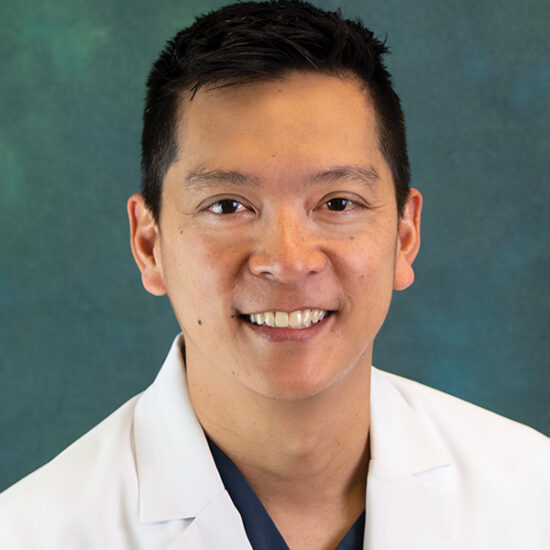Global Care Starts Locally Heading link
The Division of Global Ophthalmology at the Illinois Eye and Ear Infirmary at UIC is committed to treating and curing global eye conditions through clinical and educational outreach, innovative research, and advocacy.
The Department of Ophthalmology and Visual Sciences at UIC is comprised of several active global physicians and scientists with over 50 years of combined international experience.
The Division of Global Ophthalmology unites individuals with the resources to optimize access to ophthalmic treatments for international institutions and communities in need.
Our Vision Heading link
Quote Heading link

We are responsible for all children.
| Co-Founder, Global Ophthalmology Division
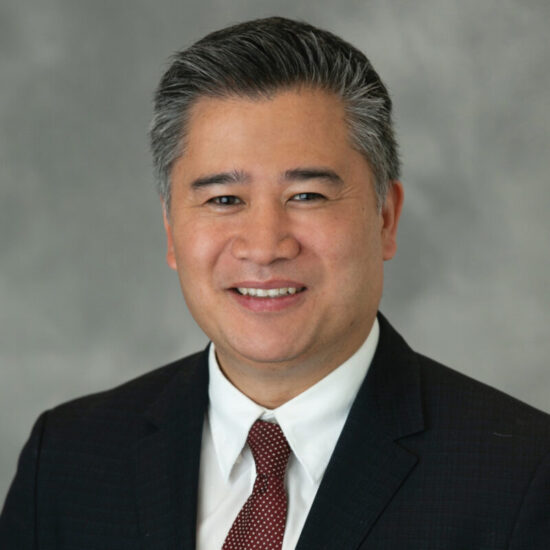
We serve the community on both a local and international level
| Co-Founder, Global Ophthalmology Division
Educational Programs Heading link
Residency and Fellow Education
Education extends beyond the walls of our institution. We foster an environment where residents and fellows have the opportunity to interact with international partners at home, and spend time away for an emergent experience. Joining the UIC family means joining a network of collaborators and friends who embrace global outreach.
Learn more about the Residency.
Global Ophthalmology Fellowship
In keeping with the mission of the Illinois Eye and Ear Infirmary, Department of Ophthalmology and Visual Sciences of the University of Illinois at Chicago, the Division of Global Ophthalmology has developed a Global Ophthalmology Fellowship program for 2019.
Learn more about the Fellowship.
Other Education
The American Academy of Ophthalmology (AAO) provides a list of ophthalmic training opportunities available around the world, including those here at the Illinois Eye and Ear Infirmary. Visit the Global Directory of Training Opportunities to begin your search, and contact Vice-Chair for Global Ophthalmology Pete Setabutr for more information about our variety of programs.
Collaborative Programs Heading link
-
Public Health in Haiti

Faculty
Dr. Daniel Alter is a Clinical Assistant Professor in the Department of Ophthalmology and Visual Sciences, as well as a University of Illinois alumnus ’83, MD/PhD ’92, Residency ’96, Vitreoretinal Fellowship ’98. His special interests include macular degeneration diseases, diabetic retinopathy, repair of detachments, uveitis, trauma, retinopathy of prematurity and surgery to remove epiretinal membranes and repair macular holes.
Projects
Dan Alter has traveled to Haiti an astounding total of twelve times over the past two years. Haiti is the poorest country in the Western Hemisphere, and has been devastated by natural disasters over the past decade. The country’s public health care system has suffered as a result, and access to basic vision care is extremely limited. Yet Haiti also has the highest prevalence of blindness in Latin America and the Caribbean. For these reasons, the Haitian people desperately need humanitarian volunteers like Dr. Alter.
-
UNIFESP Exchange Program in Sao Paulo, Brazil
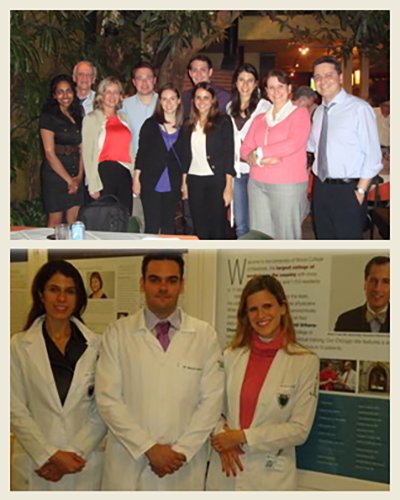
First year residents of the Department of Ophthalmology and Visual Science at UIC have the opportunity to travel to Federal University of São Paulo (UNIFESP) in Sao Paulo, Brazil for one week. During this time, they are exposed to clinical practices and academic opportunities they would not otherwise experience in Chicago. Along with the knowledge gained from this experience, they also enjoy the local customs and hospitality offered by friendly faculty and staff at UNIFESP. Past residents have greatly enjoyed their time at UNIFESP and Sao Paulo. They have kept in touch with the residents from UNIFESP and have had reunions at ARVO and AAO. It is not only a great learning experience for our residents, but an opportunity to create valuable relationships with ophthalmologists around the world.
Education
During the time in UNIFESP, residents observe ophthalmology practiced in Brazil and have the chance to learn about eye conditions that are very rare in the United States. Much of their time is spent in a busy 24 hour ophthalmology emergency room, where eye conditions like Toxoplasmosis are frequently seen. Residents also rotate through their busy uveitis, ultrasound, and retinoblastoma clinics.
UNIFESP residents come to UIC for a unique learning opportunity. It is usually coordinated so that they are able to attend the week-long Illinois Eye Review Course, where the visiting residents are exposed to ample learning initiatives. They attend all morning lectures as well as weekly Grand Rounds, tour the city of Chicago, and partake in other activities around the city. The past residents involved have been grateful to be a part of this exciting opportunity.
-
Aravind Eye Hospital in Coimbatore, India
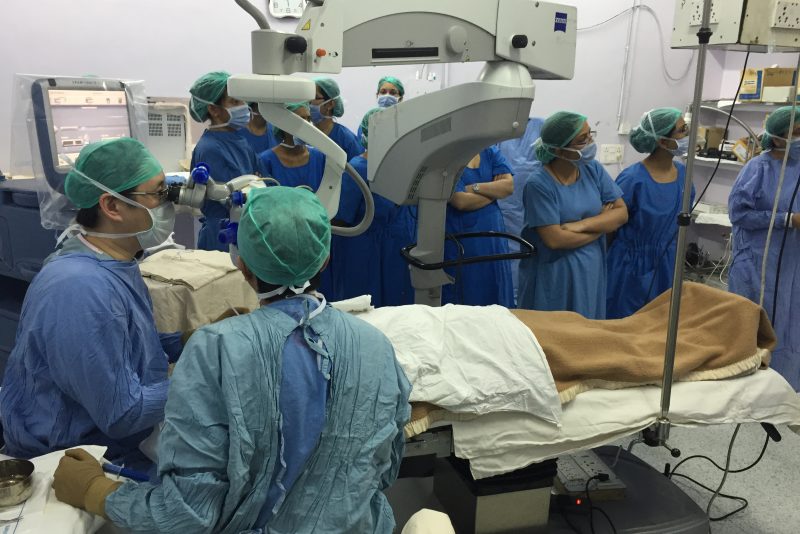
Dr. Peter MacIntosh is an Assistant Professor of Ophthalmology at the University of Illinois College of Medicine, and Director of the Neuro-Ophthalmology Service at the Illinois Eye and Ear Infirmary. Dr. MacIntosh is dual fellowship-trained in neuro-ophthalmology and oculoplastic and reconstructive surgery. His interests include papilledema; optic neuritis; diplopia; lacrimal, eyelid, and orbital disease; and combined neuro-ophthalmic and oculoplastic processes, including thyroid eye disease, facial paralysis, and compressive optic neuropathy.
“Since then, UIC has been a participant in every Aravind neuro-ophthalmology journal club, and takes turns selecting and presenting the journal articles for the month.”
Dr. MacIntosh has been working with Aravind Eye Hospital in Coimbatore, India since 2016, when he was invited to speak at their annual Update on Neuro-Ophthalmology Conference. During his time there, he spent time observing in clinic and advising on complicated neuro-ophthalmic and oculoplastics cases. Dr. MacIntosh was impressed to learn of their monthly journal club conducted by video conference between several Aravind locations across India, and even more honored when asked to join the conference from Chicago. Since then, UIC has been an active participant in the Aravind neuro-ophthalmology journal club, and takes turns selecting and presenting the journal articles for the month. This has been a great opportunity for residents and fellows to discuss the neuro-ophthalmic literature with eminent international clinicians and learn how medicine is implemented in other countries. This experience is a great example of how our Department incorporates global ophthalmology into everyday curricula at UIC.
-
KEIO University Exchange Program in Tokyo, Japan
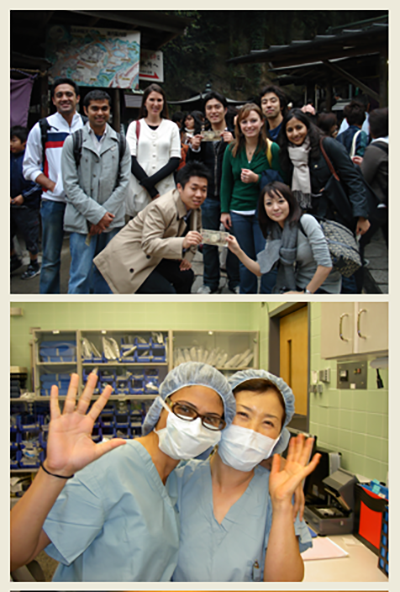
Another exciting project that the Department has initiated is an exchange program with KEIO University in Tokyo, Japan. Each semester, 8-10 second year residents from KEIO University will visit and spend 2 weeks at UIC to observe our clinicians. Additionally, our Departments’ second year residents visit Japan for 2 weeks to both observe clinical practices and to enjoy their time in Tokyo. Past residents reported having greatly enjoyed the sightseeing and the hospitality of the faculty, residents, and staff at KEIO University. One of the most important things to come out of this exchange program will continue to be the relationship formed with the KEIO University and the relationships with the doctors and residents.
Education
On the clinical end, some surprising cultural differences in clinical approaches have emerged. In Japan, not only are all patients insured, but all costs are covered. The residents are also able to observe surgeries they may never see in the US due to differential treatment approaches. In the US, only pediatric glaucoma is treated with trabeculotomies; but in Japan, open-angle glaucoma among adults is treated with trabeculotomy. Because some approaches are different, the residents experience patient complications that they may never see in the US (for example, corneal decompensation post laser surgery due to the argon laser).
The approach to training residents differs in some interesting ways as well. Notably, when using teaching scopes to examine dry eyes in patients, the doctors are able to show patients and residents videos of what happens in the eye that causes dry eye. Because the scopes are connected to video equipment, the physicians are able to rewind the tape and show patients what happens in their own eyes.
-
Mongolia
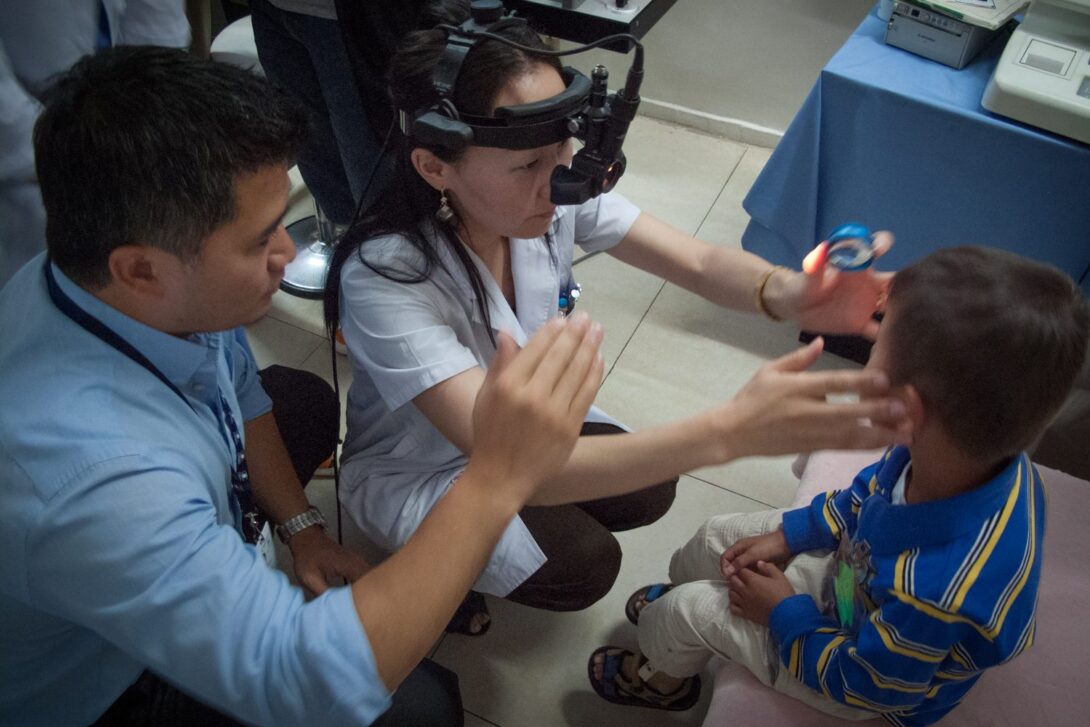
Faculty
Dr. R.V. Paul Chan is The John H. Panton Professor of Ophthalmology at the Illinois Eye and Ear Infirmary, as well as Director of Pediatric Retina and Retinopathy of Prematurity Service, and Co-Director of the Vitreoretinal Fellowship Program. His clinical practice focuses on vitreoretinal surgery, with an expertise in pediatric retinal disease.
Dr. Chan is also the Vice Chair for Global Ophthalmology at the IEEI; he is committed to global health initiatives with a focus on both surgical training and education for the diagnosis and management of adult and pediatric retinal disease. Dr. Chan’s primary research interests focus on utilizing new technology and imaging techniques to better evaluate and manage pediatric retinal disease. He receives grant funding from the NIH as well as a number of charitable foundations. He is a core team member of the Imaging and Informatics for ROP (i-ROP) consortium and leads the Global Education Network for ROP (GEN-ROP), which is an international collaboration of investigators with expertise in neonatology, ophthalmology, biomedical informatics, international health, and medical education. Together, they are implementing tele-education programs aimed at addressing the growing global burden of ROP and have established clinical, teaching, and research collaborations in Asia, Latin America, and Africa. Dr. Chan also serves as a consultant for both Orbis International and Helen Keller International (HKI), and sits on the Board of Trustees for HKI.
Projects
In collaboration with Orbis International, the National Center for Maternal and Child Health (NCMCH) in Ulaanbaatar, Mongolia, and the Global Education Network for Retinopathy of Prematurity (GEN-ROP) the first ROP screening and management program in Mongolia was established. Dr. R.V. Paul Chan and his team lead GEN-ROP, who worked with local partners in developing, implementing, and validating the screening and training program for retinopathy of prematurity. The major goal of this project is to build the capacity in Mongolia to train, issue equipment, and develop monitoring systems that will allow for more sustainable and scalable models for pediatric eye care. Support was provided by the United States Agency for International Development (USAID) Child Blindness Program.
-
Thammasat Eye Center in Bangkok, Thailand

Faculty
Dr. Setabutr is the Director of Oculoplastic and Orbital Surgery at the Illinois Eye and Ear Infirmary, University of Illinois at Chicago (UIC). He is one of only a select group of surgeons worldwide to have completed an American Society of Ophthalmic Plastic and Reconstructive Surgery (ASOPRS) approved fellowship. Dr. Setabutr has a strong interest in global health, specifically in Southeast Asia. His work in this region has helped build sustainable training and educational programs in the field of oculoplastics and orbital surgery. He lectures extensively in not only this region but around the world. He has a strong interest in clinical research that focuses on maximizing surgical outcomes. He’s published numerous peer-reviewed articles and book chapters.
Dr. Vajaranant is nationally recognized as an expert clinician and clinician-scientist. She is the recipient of several prestigious awards, including the American Academy of Ophthalmology Achievement Award and three Clinician-Scientist Awards from the American Glaucoma Society. She has secured research funding from the National Institute of Health since 2009. At present, she is the principal investigator of the National Eye Institute funded project, entitled Optic Nerve Aging and Glaucoma and site principal investigator of multicenter drug trials. In addition, she has been listed as one of Best Doctors in America, America’s Top Doctors, and Super Doctors. She directed the Ophthalmology Residency Program from 2007–2009, and became Director of the Glaucoma Service in 2010.
Projects
The Illinois Eye and Ear Infirmary entered a formal relationship with the Thammasat Eye Center in Bangkok, Thailand. Dr. Pete Setabutr leads a program that teaches surgical courses in Thailand, provides patient care at Thammasat University, supports research, and hosts Thai residents and fellows in Chicago.
-
Orbis Cybersight Live Webinar
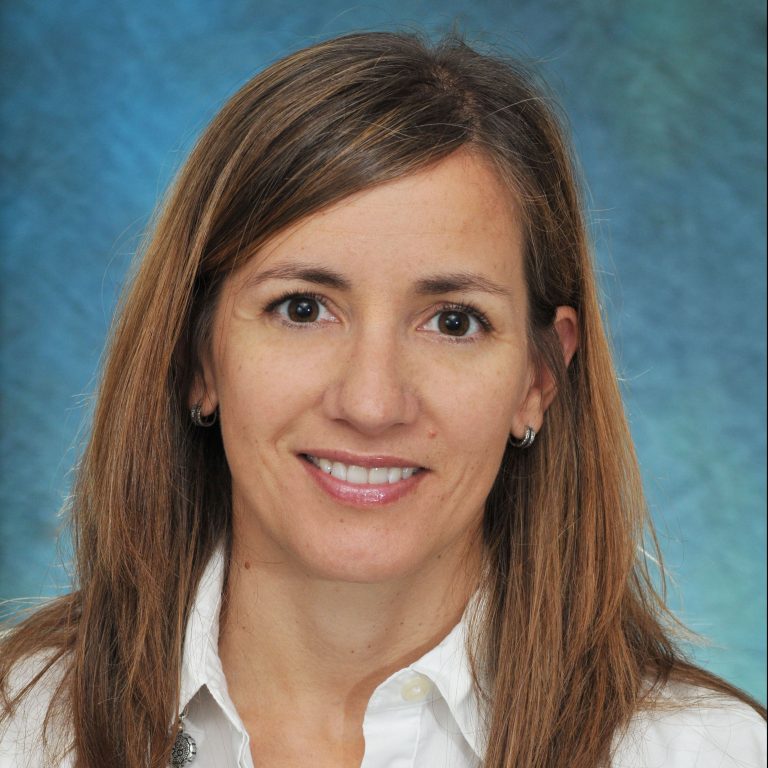
Penetrating Keratoplasty in Infectious Keratitis
The webinar will be 45 minutes with an additional 15 minutes for Q&A live with Dr. Cortina.
Infectious keratitis is a common corneal condition worldwide. Causes vary by region but can often lead to corneal opacity and permanent vision loss. In severe or non-responding cases it may also lead to perforation or progression to endophthalmitis. In certain cases, therapeutic keratoplasty is needed to control the disease or treat a perforation. In cases that can be controlled medically, residual corneal scarring may require keratoplasty for optical reasons. This webinar will discuss the indications, techniques and outcomes of therapeutic keratoplasty in infectious keratitis. It will also focus on timing of surgery and special considerations the corneal surgeon should take into account when performing these procedures.
What do I need to attend the webinar? A computer, tablet or smartphone with an Internet connection is required. A link to join the presentation will be sent by email after you register.
Who can attend? All eye health professionals are welcome to attend.
-
IPOSC ROP Africa Symposium
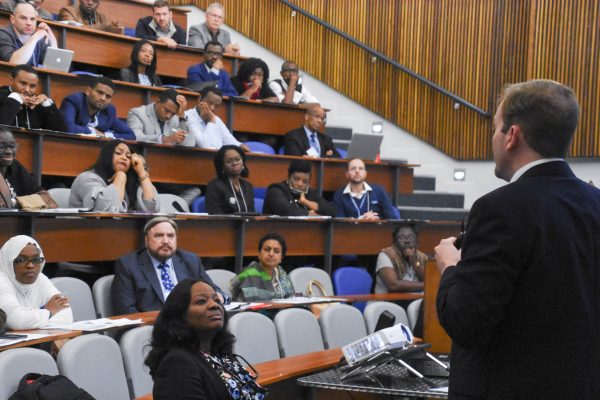
In collaboration with The International Pediatric Ophthalmology & Strabismus Council, The Illinois Eye and Ear Infirmary hosted the IPOSC ROP Africa Symposium 2018. This international symposium on retinopathy of prematurity was held September 3rd and 4th at the Red Cross War Memorial Children’s Hospital in Cape Town, South Africa. Participants attended presentations from renowned international faculty, with topics including epidemiology, neonatology, and diagnosis of ROP. Focused workshops – including a leadership development course and hand’s on skills transfer labs – provided practical tools for continuing ROP advocacy and clinical care in Sub-Saharan Africa.
“On behalf of our team… I wish to thank you for giving us this opportunity to participate in this symposium. We’ve really learned a lot. Our eyes are open.”
– Nigeria Grantee TeamThanks to the generous support of the Knights Templar Eye Foundation, Inc. (KTEF), IPOSC was able to provide education grants for selected retinopathy of prematurity teams in Sub-Saharan Africa to attend the IPOSC ROP Symposium. The goal was to assist a small number of ophthalmology teams in improving the diagnosis, management and treatment of ROP and to assist with the establishment of such specialized ophthalmology teams. There were 28 grant recipients from Sub-Saharan Africa; 4 individuals from 7 potential centers of excellence.
-
SEE International Course

In collaboration with SEE International, the Department of Ophthalmology and Visual Sciences hosted a Manual Small Incision Cataract Surgery (MSICS) course designed to expose trainees to recent developments in the clinical management of cataract extraction in humanitarian settings. Residents and Fellows engaged in this full day didactic and wet-lab session held in the state-of-the-art Cless Ophthalmic Surgical Training and Simulation Center. We thank SEE International and the volunteer faculty who joined us for sharing this unique and educational experience with our trainees!
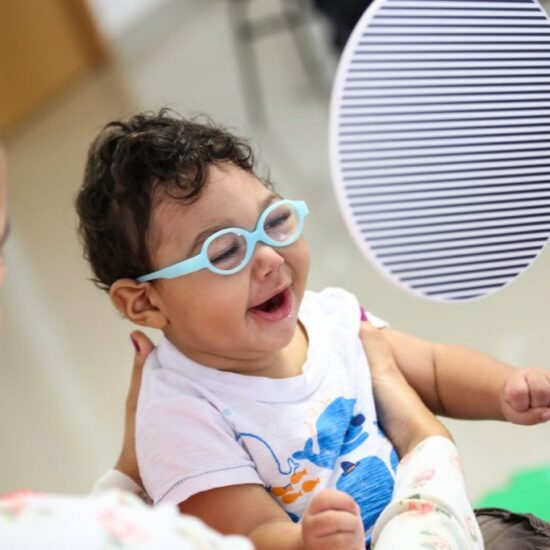
Proud Member of the International Agency for the Prevention of Blindness Heading link
Proud Member of the International Agency for the Prevention of Blindness
